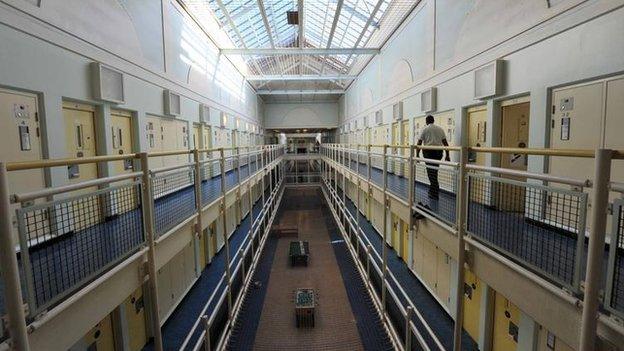Whole-life terms 'not wrong in principle', court hears
- Published
- comments

European judges ruled last year that whole-life tariffs breached human rights
Whole-life terms for some killers are "not manifestly excessive or wrong in principle", the Court of Appeal heard.
A lawyer for the attorney general said it would be "unduly lenient" not to impose a whole-life term if justified by the "seriousness of the offending".
The Court of Appeal is considering if such sentences are still legal, with a decision due at a later date.
Last year the European Court of Human Rights (ECtHR) ruled the sentences must be reviewed at some point.
But the UK government says whole-life tariffs are "wholly justified in the most heinous cases".
Barrister Felicity Gerry tells 5 live: 'You're sentencing somebody effectively to die in prison'
James Eadie QC, representing Attorney General Dominic Grieve QC, said that the Court of Appeal had already set out very clear principles and guidance on how whole-life orders could be imposed.
He said the ECtHR judgement did not remove the right of judges to impose a whole-life term - it only raised a question for the state as to whether there should be a later review.
"There is no problem," he said. "Whole-life orders are not in principle or nature incompatible [with the European Convention of Human Rights].
"There is no basis for interfering with these sentences."
Controversial ruling
The Court of Appeal is considering three cases.
Lee Newell, who murdered child killer Subhan Anwar, while already in prison for another killing. The judges are also set to correct the record regarding murderer and rapist Matthew Thomas, who was incorrectly told after his trial that he had been given a whole-life sentence.
The attorney general is separately asking the court to give a third murderer, Ian McLoughlin, a whole-life order.
The ECtHR, in Strasbourg, ruled last year that whole-life orders were a breach of human rights, following a successful appeal by murderers Jeremy Bamber, Douglas Vinter and Peter Moore.
Cousin of Jeremy Bamber, who killed 5 people, David Boutflour: "We have efficient law-making set-up"
The court said that while it accepted whole life orders could be justified, there should nevertheless be some way of having imprisonment reviewed after 25 years.
That decision prompted the judge dealing with McLoughlin to sentence him to life with a minimum term of 40 years, rather than a whole-life term.
Speaking after the hearing, Mr Grieve said: "This hearing was about preserving the principle that whole life orders can be imposed for particularly heinous and serious crimes. I asked the Court of Appeal to look again at the sentence handed down to Ian McLoughlin as I believed the sentencing judge mistakenly took into account a decision of the European Court of Human Rights which is inconsistent with the domestic legislation and case law by which he was bound.
"I believed the seriousness of this case required a whole life order because McLoughlin had a previous conviction for manslaughter in 1984, a conviction for murder in 1992, and because the murder for which he was being sentenced was committed in the course of robbery."
The outcome of the appeals could determine the future direction of sentencing for the most serious killers in England and Wales, as well as have an impact on the 52 prisoners currently on whole-life terms. It may also affect the men convicted of murdering Fusilier Lee Rigby. Their sentencing has been postponed until after the outcome of this appeal.
- Published2 January 2014
- Published21 August 2013
- Published9 July 2013
- Published9 July 2013